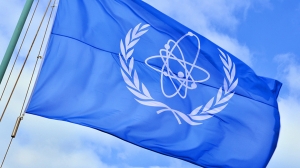IAEA IPPAS mission's work done in Belarus

MINSK, 9 July (BelTA) – A group of experts of the International Atomic Energy Agency (IAEA) finished a consulting mission concerning the physical protection of nuclear installations in Belarus on 9 July, BelTA learned from the Nuclear and Radiation Safety Department of the Belarusian Emergencies Ministry (Gosatomnadzor).
The International Atomic Energy Agency's International Physical Protection Advisory Service (IPPAS) mission stayed in Belarus for two weeks. The mission had to review the national practices of ensuring the security of nuclear materials and nuclear installations. The team reviewed security measures implemented by the Belarusian nuclear power plant, security aspects of the transportation of nuclear materials and the cyber security of nuclear installations. The mission compared national security procedures and practices to the Convention on the Physical Protection of Nuclear Material (CPPNM) and its Amendment, to the IAEA's guidelines on nuclear security. Belarus is a party to the convention but has yet to ratify the amendment that was passed in 2005.
The team worked out recommendations and proposals on helping Belarus enhance and ensure physical nuclear protection. Cutting-edge practices, which can be an example for other IAEA member states, were detected.
According to Elena Buglova, Director of the IAEA Division of Nuclear Security, by welcoming the IPPAS mission Belarus demonstrated its commitment and constant efforts to reinforce the national physical nuclear protection regime. The country also made a contribution to improving IPPAS methods in the last few months, in particular, by arranging a pilot self-evaluation of its physical nuclear protection regime ahead of this mission.
Belarusian Emergencies Minister Vadim Sinyavsky noted the physical nuclear protection system has to be ready to adequately respond to new challenges and threats in a rapidly changing modern world. “Since Belarus is implementing its first nuclear energy program, recommendations of international experts are particularly important for enhancing state requirements in the area of nuclear physical protection. This is why we believe the completed IPPAS mission to be extremely important. We seriously treat all the recommendations we've received and can assure that all of them will be fulfilled,” he stressed.
Joseph Sandoval of the USA was the head of the IPPAS mission sent to Belarus. The team also included eight experts from the International Atomic Energy Agency, the UK, France, Switzerland, Russia, Bulgaria, and Ukraine.
It was the third IPPAS mission Belarus had welcomed. The previous two missions happened in 2000 and 2009. As part of the third mission the experts met with representatives of the Nuclear and Radiation Safety Department of the Belarusian Emergencies Ministry (Gosatomnadzor), the Internal Affairs Ministry, and other government agencies. The team also visited the Belarusian nuclear power plant.













